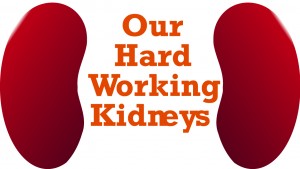Please consult your doctor or regular health physician before following suggestions found in any Sun Day health columns/stories.

Kidney failure is caused by both acute situations and chronic problems.
According to medicinenet.com, acute and prerenal causes of kidney failure due to decreased blood supply to the kidney are as follows:
1. Hypovolemia (low blood volume) is due to blood loss
2. Dehydration occurs from loss of body fluids caused by vomiting, diarrhea, sweating, or fever
3. A poor intake of liquid, often seen in the elderly who live alone. A healthy person should produce about 2-4 pints of urine daily, depending on fluid intake.
4. Diuretic (water pills) medication which cause excessive water loss.
5. Abnormal blood flow to and from the kidney, caused by obstruction of the renal artery or vein.
Acute and renal causes of kidney failure, which are caused by damage directly to the kidney itself include:
1. Sepsis, which causes kidneys and other organs to shut down by overwhelming the immune system through infection
Sun City resident Pat Morgan spent 15 days in Intensive Care last year with sepsis and suffered kidney failure from it. Morgan said after two stents were placed in her kidneys they began to work again.
2. Medications like nonsteroidal anti-inflammatory drugs, medicines with iodine, and some antibiotics, can be harmful to kidneys
3. Rhabdomyolysis is marked by muscle breakdown, which causes damaged muscle fibers to clog the kidneys. Causes include crash injuries burns, trauma, and some medicines treating high cholesterol.
4. Multiple myeloma is a cancer of the blood plasma cells.
5. Acute inflammation of the filtering system of the kidneys occurs in diseases such as nephritis. Many diseases can cause this inflammation, including systemic lupus erythematosus.
Post-renal causes of kidney failure include:
1. Obstruction of the ureters, causing back pressure to the kidneys, which are continuing to produce urine. Eventually, with increasing pressure, the kidneys shut down.
2. Prostatic hypertrophy or prostate cancer can prevent the bladder from emptying by blocking the urethra.
3. Tumors that occur in the abdomen and obstruct the ureters from functioning.
4. Kidney stones that usually affect only one kidney but may cause a lone kidney to fail.
Chronic renal failure, which occurs over months and years, can happen as a result of:
1. Diabetes Type 1 or Type 2
2. Poorly-controlled blood pressure
3. Chronic glomerulonephritis, where the part of the kidney that helps filter waste is damaged.
Less common chronic renal failure factors are:
1. Polycystic kidney disease (a single simple cyst is usually not a problem and can be watched for growth)
2. Reflux nephropathy or backward flow of urine
3. Kidney stones
4. Prostate disease
Then, of course, there is kidney cancer caused by the development of a cancerous tumor which, over a period of time, can metastasize and spread to other parts of the body.
Terry Hora, another Sun City resident, has a fascinating story to tell of his survival of two cancerous tumors, one in each of his kidneys. In 2011, Terry was broad-sided in a car accident, which led to testing being done on his body parts.
An irregular right lung scan led to kidney CAT and MRI scans that revealed dark spots, especially on his right kidney. Next needle biopsies were done on both kidneys, which revealed double kidney cancer. Hora’s original urologist concluded that surgery must be done.
Because Hora did not want to wait for a later surgical date, he contacted a second surgeon, Dr. Flanagan at Loyola Medical Center in Maywood. There,, on March 5, 2012, surgery was done to remove the larger right kidney with the tumor, which could not be saved. Three days later, about one-quarter of Hora’s remaining left kidney was removed surgically.
Hora is now cancer-free and has check-ups every six months. He takes no radiation or chemo meds. His only side-effect is the presence of a small bulge on his one side due to the absence of a rib that had to be removed during one of the two surgeries.
“I don’t want that inner tube so I keep swimming and exercising to strengthen the area,” Hora said.
Operating with only one kidney, Hora is cautious of protecting his remaining organ when he plays handball, but is mindful of his doctor’s instruction to keep exercising.
Because kidney disease is often called “the silent killer,” it is important to pay attention to the following symptoms as kidney function decreases:
1. Lethargy
2. Weakness
3. Shortness of breath/ rapid breathing;
4. Generalized swelling
5. Loss of appetite
6. Blood pressure rising.
Don’t wait for the final stages of congenital heart failure and coma. Unrecognized or untreated, kidney failure can lead to life-threatening circumstances.
Next Edition: Part 3: Aged kidneys and risk factors, treatment, and research




